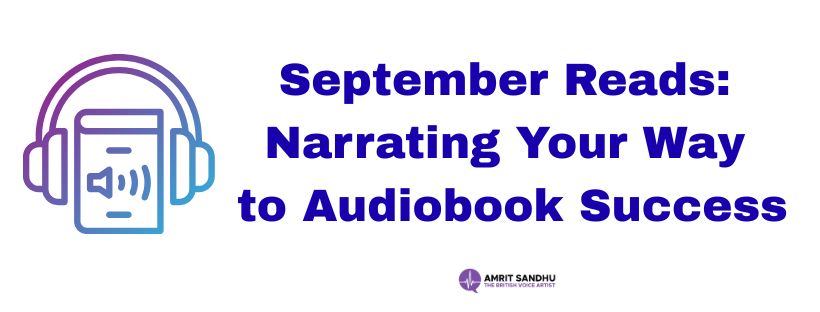As autumn approaches, September ushers in a season of growth and opportunity — the perfect time for voice-over artists to dive into the flourishing world of audiobooks. Narrating audiobooks offers a unique avenue to showcase storytelling skills, connect deeply with audiences, and build a thriving voice-over career.
This September, let’s explore how you can narrate your way to audiobook success flourishing world of audiobooks.
1. Embrace the Story’s Soul
Narrating an audiobook is an intricate art form that transcends mere reading. It demands becoming fully immersed in the narrative’s essence, transforming written text into a vibrant auditory experience. To truly captivate listeners over extended hours, a narrator must inhabit the world crafted by the author. This means embodying the emotions that ripple beneath the surface — the joys, fears, tensions, and triumphs that define the story’s heart. Effective narration honours the original voice, respecting its tone and intent, while simultaneously allowing the narrator’s interpretation to breathe life into the text. This delicate balance requires deep engagement with the material, attention to pacing that sustains momentum, and nuanced expression that invites listeners to experience the journey as vividly as possible.
2. Develop a Distinctive Narration Style
Your narration style is your vocal fingerprint — unique and instantly recognizable. Crafting a style that aligns with the genre, content, and audience is paramount. For example, a warm, soothing tone may suit a gentle memoir, while an energetic and lively rhythm fits a fast-paced thriller or young adult novel. Dramatic intensity can elevate fantasy or historical fiction. The key lies in authenticity: your style should feel natural and comfortable, yet flexible enough to serve the story’s demands. This signature style builds listener loyalty, helping your voice stand out amid the crowded audiobook market and establishing you as a dependable and engaging narrator.
3. Master Character Voices and Dialogue
One hallmark of exceptional audiobook narration is the skillful differentiation of characters. Creating distinct, consistent voices for each persona—through subtle shifts in pitch, tone, accent, or cadence—enables listeners to effortlessly follow conversations and internalize personalities. However, these variations must never feel forced or theatrical; naturalness preserves the story’s believability and maintains immersion. Mastery over dialogue requires a blend of creative vocal technique and disciplined restraint, ensuring that character distinctions enrich rather than distract from the narrative’s flow. By cultivating this skill, narrators invite their audience deep into the story’s world, rendering complex plots and cast interactions both engaging and comprehensible.
4. Maintain Stamina and Vocal Health
Audiobook narration is a demanding discipline that requires exceptional vocal endurance. Lengthy recording sessions can strain even the most seasoned voice artists, making stamina and vocal health paramount. Regular vocal warm-ups serve as essential preparation, gently awakening and conditioning the vocal cords to prevent fatigue and injury. Simple exercises—such as lip trills, humming, and scales—improve flexibility and control. Additionally, hydration is critical; drinking ample water keeps the vocal folds lubricated and responsive, reducing dryness and irritation. Beyond the studio, adopting healthy habits like avoiding excessive caffeine or shouting, managing stress, and getting sufficient rest fortifies the voice’s resilience. By prioritizing vocal care, narrators ensure consistent performance quality, maintaining the rich tone, clarity, and emotional depth required for immersive storytelling, even through marathon recording days.
5. Utilize Quality Recording Techniques
Exceptional narration deserves equally professional sound quality. Investing in high-grade recording equipment, particularly a suitable microphone tailored to your vocal range, significantly enhances clarity and presence. Complement this with effective soundproofing measures—such as acoustic panels or quiet home studios—to eliminate ambient noise and echoes that could distract listeners. Familiarity with editing software adds another layer of polish, allowing the removal of breaths, clicks, or imperfections without sacrificing naturalness. Clean, crisp audio is more than just technical polish; it honors the listener’s experience, ensuring your narrative shines without disruption. Meeting industry audio standards signals professionalism and increases your competitiveness in the audiobook market.
6. Build Your Audiobook Portfolio
Establishing a robust audiobook portfolio begins with strategic choices. Starting with shorter projects or demo samples allows you to hone your skills, demonstrate versatility, and build credibility without overwhelming yourself. Showcase a diverse range of styles and genres to attract varied clients. Utilize platforms which serve as hubs connecting narrators with authors and publishers seeking talent. A thoughtfully curated portfolio becomes your calling card, opening doors to larger projects and collaborations. Over time, each successful narration adds to your reputation, propelling your career forward in the thriving audiobook industry.
7. Engage with the Audiobook Community
Success in audiobook narration extends beyond vocal skill; it thrives within a vibrant, interconnected community. Engaging actively with authors, producers, and fellow narrators opens doors to collaborative projects, constructive feedback, and invaluable industry insights. Networking builds relationships that often lead to referrals and repeat work, creating a supportive ecosystem that nurtures growth. Participation in forums, both online and in-person, invites you to share experiences, troubleshoot challenges, and exchange resources. Workshops provide hands-on opportunities to refine technique and stay inspired, while social media groups dedicated to audiobook narration foster real-time conversations and connections. Immersing yourself in this community not only enhances your knowledge but also positions you as an engaged, professional voice in the field, amplifying your visibility and credibility.



